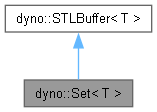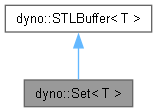 |
PeriDyno 1.2.1
|
 |
PeriDyno 1.2.1
|
An CPU/GPU implementation of the standard set suitable for small-size data. More...
#include <Set.h>


Public Member Functions | |
| DYN_FUNC | Set () |
| DYN_FUNC T * | find (T val) |
| DYN_FUNC iterator | begin () |
| DYN_FUNC iterator | end () |
| DYN_FUNC void | clear () |
| DYN_FUNC uint | size () |
| DYN_FUNC uint | count (T val) |
| DYN_FUNC T * | insert (T val) |
| DYN_FUNC bool | empty () |
| DYN_FUNC int | erase (const T val) |
| DYN_FUNC void | erase (T *val_ptr) |
 Public Member Functions inherited from dyno::STLBuffer< T > Public Member Functions inherited from dyno::STLBuffer< T > | |
| DYN_FUNC | STLBuffer () |
| DYN_FUNC void | reserve (T *beg, uint buffer_size) |
| DYN_FUNC uint | max_size () |
Private Attributes | |
| uint | m_size = 0 |
Additional Inherited Members | |
 Public Types inherited from dyno::STLBuffer< T > Public Types inherited from dyno::STLBuffer< T > | |
| using | iterator = T * |
 Protected Member Functions inherited from dyno::STLBuffer< T > Protected Member Functions inherited from dyno::STLBuffer< T > | |
| DYN_FUNC T * | bufferEnd () |
 Protected Attributes inherited from dyno::STLBuffer< T > Protected Attributes inherited from dyno::STLBuffer< T > | |
| uint | m_maxSize = 0 |
| T * | m_startLoc = nullptr |
An CPU/GPU implementation of the standard set suitable for small-size data.
Be aware do not use this structure if the data size is large. The computation complexity is O(n^2) for some specific situation. All elements are organized in ascending order
| T |